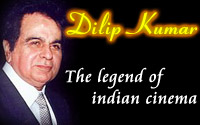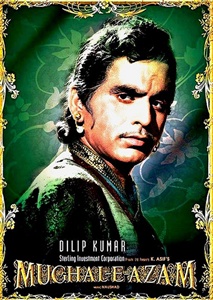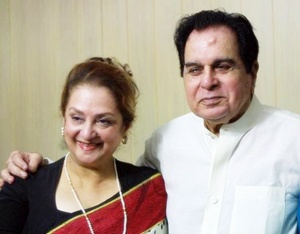|
|

|
|

|
HOME |
 One
of the greatest actors ever to grace the Indian silver screen..Dilip Kumar was
a name to reckon with in the Hindi tinsel world in the 50's and 60's. His unique
style of acting has inspired many upcoming actors and hopefuls but none have
even remotely been able to match his natural, one and only style.Dilip aka Yusuf
Khan was born in Peshawar (now Pakistan) in 1922 in a Pathan Family of 12
children. His father who was a fruit merchant later moved to Mumbai in
Maharashtra and set up business there.
One
of the greatest actors ever to grace the Indian silver screen..Dilip Kumar was
a name to reckon with in the Hindi tinsel world in the 50's and 60's. His unique
style of acting has inspired many upcoming actors and hopefuls but none have
even remotely been able to match his natural, one and only style.Dilip aka Yusuf
Khan was born in Peshawar (now Pakistan) in 1922 in a Pathan Family of 12
children. His father who was a fruit merchant later moved to Mumbai in
Maharashtra and set up business there.
A small tiff with his father made young Yusuf run away to Pune. There he started to work in a British Army canteen and later having saved some amount, set up his own fruit stall. As far as his interest in art goes, even from a young age Yusuf was fond of gazals and was himself a good singer and sitar player never knowing that later, he was to render his voice in a Hrishida film.
In the 40's Yusuf was initiated to the world of films by the leading actress of those days Devika Rani, who was also the proprietor of the famous studio Bombay Talkies. Yusuf who was re-christened Dilip Kumar by a famed Hindi novelist made his debut in their film 'Jwar Bhatta' in 1944. He became successful as a hero opposite singing actress Noorjehan in the film 'Jugnu' (1947)..next came 'Mela' (1948) in which he played the doomed lover and then Mahboob Khan's 'Andaz' (1949) a love triangle opposite superstars Nargis and Raj Kapoor which became a big hit and elevated him to a super star level.
 The
next three years saw him in tragic roles very similar to his role in Mela in
films like Babul (1950), Arzoo (1950), Jogan(1950), Deedar(1951), Udan Khatola
(1955) and Bimal Roy's super hit Devdas. The release of a number of tragic films
earned him the title of the 'Tragedy King' initially. With his naturalistic
emoting conveyed through changing expressions and a well modulated voice he gave
a new meaning to Hindi films and became a role model to young aspirants as well
as established ones. However, pain-soaked roles took its toll on the actor's
psyche, which reportedly made him seek psychological counselling..
The
next three years saw him in tragic roles very similar to his role in Mela in
films like Babul (1950), Arzoo (1950), Jogan(1950), Deedar(1951), Udan Khatola
(1955) and Bimal Roy's super hit Devdas. The release of a number of tragic films
earned him the title of the 'Tragedy King' initially. With his naturalistic
emoting conveyed through changing expressions and a well modulated voice he gave
a new meaning to Hindi films and became a role model to young aspirants as well
as established ones. However, pain-soaked roles took its toll on the actor's
psyche, which reportedly made him seek psychological counselling..
50's and part of 60's saw his prime time along with Raj Kapoor and Dev Anand and earned him Filmfare awards for best actor for Daag in 1953 and consecutively for Azad (1955), Devdas (1956), Naya Daur (1957) etc. His other successful film during this time were Mughal- e- Azam (1960), Madhumati, Ganga Jamuna (1961) which saw one of the best performances in his career and Ram aur Shyam (1967).
In between, his continuous tragic roles gave a high handedness to his characters that he consciously tried to break free of his image and began to accept more light hearted films in which also he excelled. His versatility shown through in films like Ganga Jamuna and the comedy Ram Aur Shyam, two of the best roles in his career, where in the latter playing a double role his comical brilliance was displayed.
On the personal front, Dilip the star was linked with a
number of actresses like Kamini Kaushal, Madhubala, Vyjayanti Mala Bali but he
never settled down until late at the age of 44 he married the lovely young Saira
Bano. He created quite a sensation
in those days by marrying her, an actress half his age. Much later he created
quite a similar stir by getting married a second time to Asma while still very
much married to Saira. But his second marriage was a short lived one.
sensation
in those days by marrying her, an actress half his age. Much later he created
quite a similar stir by getting married a second time to Asma while still very
much married to Saira. But his second marriage was a short lived one.
After Ram Aur Shyam, his career suffered a drawback in the 70's. No other film clicked at the box office and Dilip reduced work to one or two films at a time. By the end of 70's he took a complete break from films for some years. He became involved in various other interests like literature, theatre and comparative religions. But he made a triumphant return to Hindi cinema in the 1980s when Amitabh dominated the scene, with meaty roles in two big hits, Manoj Kumar's 'Kranti' (1981) and Ramesh Sippy's 'Shakti' (1982) in which the latter earned him yet another Filmfare award. Then came Subhash Ghai's Vidhaata, Karma and then Saudagar as late as in 1991which were equally successful.
This living legend of Indian Cinema has been honoured with the Filmfare Lifetime achievement award in1993 and the Prestigious Dada Saheb Phalke award in 1995 for his contributions. In a career spanning over five decades this veteran actor with his fine performances has found a place in the world of Hindi films that few could vie for, though he retains that his first love was never cinema but soccer. The aging actor now leads a retired life but his charisma lingers..